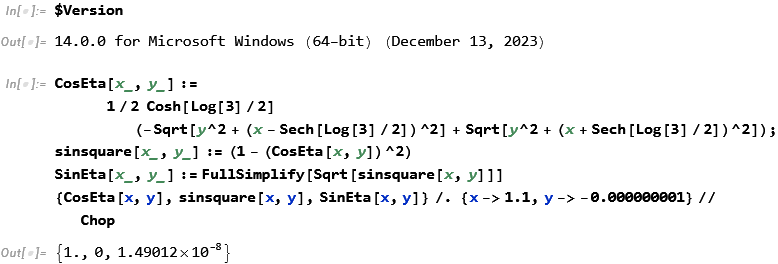The OP's code for CosEta suffers from subtractive/catastrophic cancellation when y is a small floating point number. This may be remedied by rationalization. Simplification will change the round-off error, change the edge cases, but is not designed to eliminate the problem.
Here is a version of CosEta, obtained by rationalizing the OP's code for it.
(* Num. stable *)
CosEta[x_, y_] := (2 x)/(
Sqrt[y^2 + (x - Sech[Log[3]/2])^2] +
Sqrt[y^2 + (x + Sech[Log[3]/2])^2]);
sinsquare[x_, y_] := (1 - CosEta[x, y]^2)(*(1+CosEta[x,y])*);
SinEta[x_, y_] := Sqrt[sinsquare[x, y]];
OP's example:
SinEta[x, y] /. {x -> 1.1, y -> -0.000000001}
(* 0. *)
SinEta[1.1, -0.000000001]
(* 0. *)
More edge cases. The above code:
Table[
SeedRandom[n, Method -> "MersenneTwister"];(* for reproducibility *)
With[{x = RandomReal[{-6, 20}]},
SinEta[x, x*$MachineEpsilon*RandomReal[2^28]]],
{n, 200}] // Im // Counts
(* <|0 -> 200|> *)
With OP's code for CosEta:
Table[
SeedRandom[n, Method -> "MersenneTwister"];(* for reproducibility *)
With[{x = 10^RandomReal[{-6, 20}]},
SinEta[x, x*$MachineEpsilon*RandomReal[2^24]]],
{n, 200}] // Im // Counts // KeySort
(*
<|0 -> 140, 2.10734*10^-8 -> 2, 3.65002*10^-8 -> 4,
1.47514*10^-7 -> 2, 4.67906*10^-7 -> 5, 1.83557*10^-6 -> 2,
0.0000113751 -> 2, 0.0000258281 -> 1, 0.000181464 -> 3,
0.00031899 -> 8, 0.00236808 -> 10, 0.0207007 -> 10, 0.0518223 -> 4,
0.144338 -> 4, 0.57735 -> 3|>
*)
A numerically stable refactoring of SinEta:
SinEta[x_, y_] := With[{yy = y^2},
With[{u = 4 yy + 3, w = 4 yy - 3, xx = x^2},
With[{z = (u + Sqrt[u^2 + (8 w + 16 xx) xx])},
Sqrt[(z - 4 xx)/(z + 4 xx)]
]]];
SinEta[x, y] - Sqrt[sinsquare[x, y]] // TrigToExp //
FullSimplify[#, {x, y} \[Element] Reals] &
(* 0 *)





